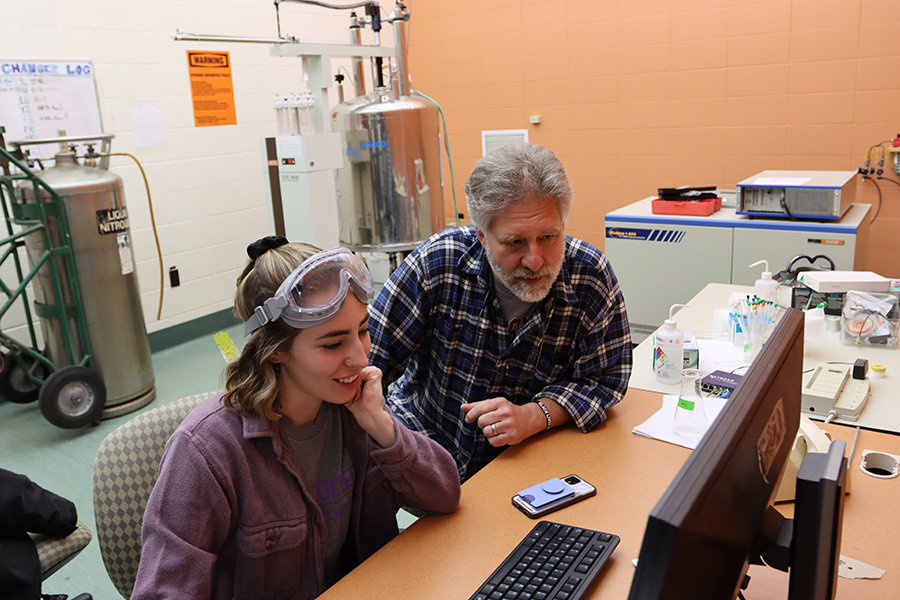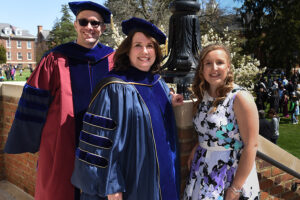Collaboration, Chemistry Lead to Vital Instrument Acquisition
Philanthropic efforts, including a matching gift from Lisa and James Wilson, ’79, ’77, facilitate Albion’s purchase of a new nuclear magnetic resonance spectrometer, a “workhorse” in the Chemistry and Biochemistry Department.
May 16, 2022

Hannah Geiss, ’22, views data from an NMR spectrometer sample with Dr. Cliff Harris, professor of chemistry.
An important instrument used by more than 100 students each semester in Albion College’s Department of Chemistry and Biochemistry will be upgraded to a brand new model during the 2022-23 academic year.
For more than 20 years a nuclear magnetic resonance (NMR) spectrometer, manufactured by JEOL Ltd. and acquired through support from the Herbert H. and Grace A. Dow Foundation, has served as backbone equipment for the department, both for class work as well as for student and faculty research. NMR spectrometry is essentially the same technology as magnetic resonance imaging, or MRI, for humans, only at the molecular level.
But with all of that service, the miles, so to speak, have added up.
“This is a workhorse instrument for the department,” said Dr. Lisa Lewis, professor and interim chair of chemistry and biochemistry, adding that an NMR spectrometer is required instrumentation in order to maintain accreditation by the American Chemical Society.
According to Lewis, replacement had become necessary, and obsolescence was not far down the road.
“JEOL has been supporting us and doing everything they can to find spare parts, but now they are running out of sources,” Lewis said. “We have been able to upkeep and replace some smaller instruments, but when it comes to an instrument of this expense, you typically need external support.”
The Right Formula
A grant application to the National Science Foundation, Lewis said, was not in the cards since NSF funds typically don’t support replacement equipment. But a conversation with Albion’s Institutional Advancement team proved to be a catalyst.
A new $1 million gift from 1977 Albion alumnus James M. Wilson, M.D. Ph.D., and his wife, Lisa Wilson, ’79, was announced at the May 7 Commencement ceremony, and a portion of their gift is being used to match an in-kind gift from another source to complete the purchase of the new spectrometer.
“This is a great example of collaboration,” said Kim Arndts, ’84, chief advancement officer – alumni relations and stewardship. “We were able to identify members of the Albion College community who would support this effort. Philanthropy is here to solve problems, and it felt really good that we could lend our expertise to help.”
In 2018, the Wilsons’ $5.1 million gift established the Lisa and James Wilson Institute for Medicine at Albion College. Through an innovative academic curriculum and immersive clinical, research and community service initiatives, the Wilson Institute prepares Albion students for successful entry into graduate and professional programs en route to becoming altruistic leaders in healthcare.
Dr. Wilson is one of the world’s foremost genetics researchers. In his Commencement address to Albion’s Class of 2022, the University of Pennsylvania medical professor said he “learned to think big” at Albion and that “I hope the purpose you learned will serve as a beacon for you to continue to do good in this world. We’re counting on you.”
‘Central to Our Work’

Biochemistry major Samantha Dye, ’23 (right), with Dr. Craig Streu (left) and Dr. Lisa Lewis at Commencement May 7.
Samantha Dye, ’23, is already excited to use the new NMR spectrometer. The order has been placed and the new instrument, also made by JEOL, is due to arrive near the end of the calendar year and be ready for use by the start of the spring 2023 semester.
Dye, a biochemistry major, Spanish minor and Wilson Institute member from Canton, Mich., just completed an internship at the University of Pennsylvania through The Philadelphia Center and later this month will begin a summer Research Experience for Undergraduates at the University of Puerto Rico.
“I use [the spectrometer] in most of my chem classes and for my research quite frequently because I am working on a synthetic project,” Dye said. “That means every time before I can move on to the next step, the next reaction, I want to make sure what I have is pure and what I want, and I do that by using the NMR.”
Martina Zafferani, ’17, who last month successfully defended her Ph.D. dissertation at Duke University, credited Albion and its Chemistry faculty for a program that emphasizes independent, hands-on research.
“It is very unusual that undergrads are allowed to use the NMR themselves. It was crucial for my speedy progress in graduate school,” Zafferani said. “Having a brand new NMR is essential for students to get the same hands-on experience that gave me an edge in grad school, and to keep up with technological advances in the field.”
Dr. Craig Streu’s regular use of the instrument — the actual one that will be in use for one more semester — goes back to his undergraduate years as well. The associate professor of biochemistry received his bachelor’s degree from Albion in 2004.
“I’m probably the only person who will miss the old NMR,” Streu said, before quickly adding, “I’m thrilled for the new NMR because it is central to our work at the cutting edge in classes and in research. It’s used throughout the curriculum in ways that are only possible at a place like Albion. It’s difficult to explain the extent of its importance to our program.”